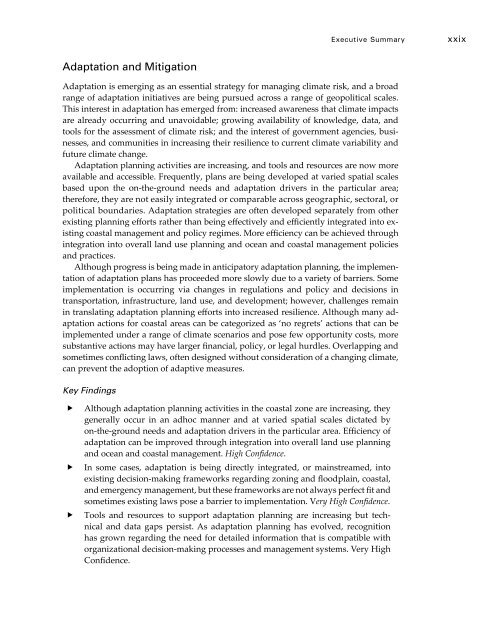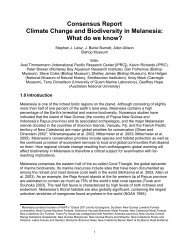Coastal Impacts, Adaptation, and Vulnerabilities - Climate ...
Coastal Impacts, Adaptation, and Vulnerabilities - Climate ...
Coastal Impacts, Adaptation, and Vulnerabilities - Climate ...
You also want an ePaper? Increase the reach of your titles
YUMPU automatically turns print PDFs into web optimized ePapers that Google loves.
Executive Summaryxxix<strong>Adaptation</strong> <strong>and</strong> Mitigation<strong>Adaptation</strong> is emerging as an essential strategy for managing climate risk, <strong>and</strong> a broadrange of adaptation initiatives are being pursued across a range of geopolitical scales.This interest in adaptation has emerged from: increased awareness that climate impactsare already occurring <strong>and</strong> unavoidable; growing availability of knowledge, data, <strong>and</strong>tools for the assessment of climate risk; <strong>and</strong> the interest of government agencies, businesses,<strong>and</strong> communities in increasing their resilience to current climate variability <strong>and</strong>future climate change.<strong>Adaptation</strong> planning activities are increasing, <strong>and</strong> tools <strong>and</strong> resources are now moreavailable <strong>and</strong> accessible. Frequently, plans are being developed at varied spatial scalesbased upon the on-the-ground needs <strong>and</strong> adaptation drivers in the particular area;therefore, they are not easily integrated or comparable across geographic, sectoral, orpolitical boundaries. <strong>Adaptation</strong> strategies are often developed separately from otherexisting planning efforts rather than being effectively <strong>and</strong> efficiently integrated into existingcoastal management <strong>and</strong> policy regimes. More efficiency can be achieved throughintegration into overall l<strong>and</strong> use planning <strong>and</strong> ocean <strong>and</strong> coastal management policies<strong>and</strong> practices.Although progress is being made in anticipatory adaptation planning, the implementationof adaptation plans has proceeded more slowly due to a variety of barriers. Someimplementation is occurring via changes in regulations <strong>and</strong> policy <strong>and</strong> decisions intransportation, infrastructure, l<strong>and</strong> use, <strong>and</strong> development; however, challenges remainin translating adaptation planning efforts into increased resilience. Although many adaptationactions for coastal areas can be categorized as ‘no regrets’ actions that can beimplemented under a range of climate scenarios <strong>and</strong> pose few opportunity costs, moresubstantive actions may have larger financial, policy, or legal hurdles. Overlapping <strong>and</strong>sometimes conflicting laws, often designed without consideration of a changing climate,can prevent the adoption of adaptive measures.Key FindingsffffffAlthough adaptation planning activities in the coastal zone are increasing, theygenerally occur in an adhoc manner <strong>and</strong> at varied spatial scales dictated byon-the-ground needs <strong>and</strong> adaptation drivers in the particular area. Efficiency ofadaptation can be improved through integration into overall l<strong>and</strong> use planning<strong>and</strong> ocean <strong>and</strong> coastal management. High Confidence.In some cases, adaptation is being directly integrated, or mainstreamed, intoexisting decision-making frameworks regarding zoning <strong>and</strong> floodplain, coastal,<strong>and</strong> emergency management, but these frameworks are not always perfect fit <strong>and</strong>sometimes existing laws pose a barrier to implementation. Very High Confidence.Tools <strong>and</strong> resources to support adaptation planning are increasing but technical<strong>and</strong> data gaps persist. As adaptation planning has evolved, recognitionhas grown regarding the need for detailed information that is compatible withorganizational decision-making processes <strong>and</strong> management systems. Very HighConfidence.
















